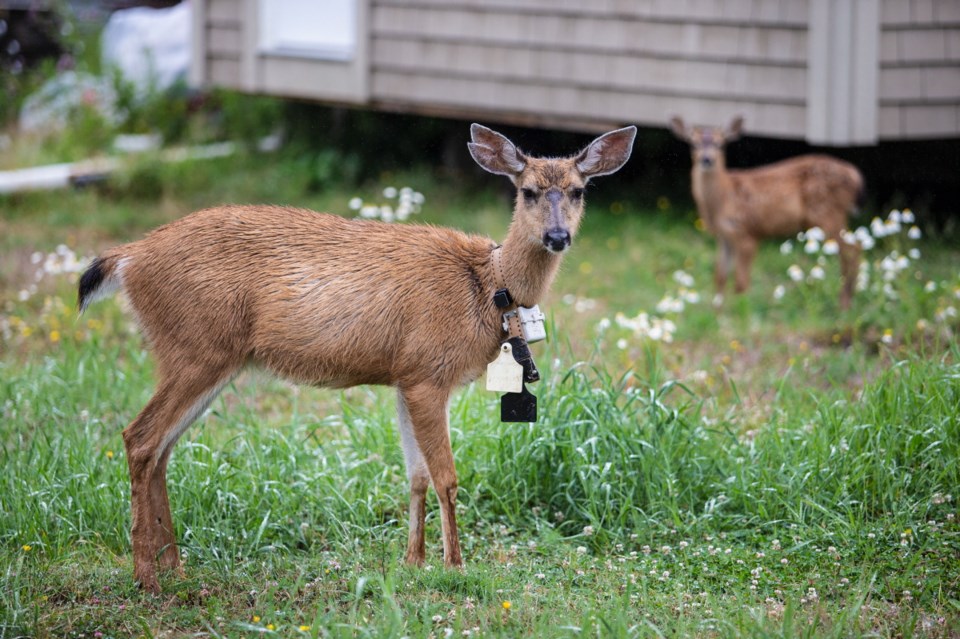About 60 female deer in Oak Bay have been given a contraceptive vaccine as part of a cutting-edge project to cut down on the black-tailed deer population.
The municipality of Oak Bay and the province are funding the urban-deer-management research project administered by the Urban Wildlife Stewardship Society.
Complaints about deer damaging gardens, disrupting traffic, attacking people and pets, and discomfort about killing deer, led to the contraception effort.
The province and the municipality have each contributed $20,000 for the project, with the society providing services in kind.
Administered to does, the immuno-contraception vaccine — called porcine zona pellucida — causes the production of antibodies that prevent fertilization of eggs. It has been successfully used on horses, but it’s not yet known if it’s effective in deer.
“This project, if proven successful, has the potential to be a significant solution for any municipality across North America looking to co-exist with urban wildlife,” said Kristy Kilpatrick, president of the non-profit Urban Wildlife Stewardship Society, which formed in the wake of a 2015 deer cull in Oak Bay.
Oak Bay spokeswoman Hayley Goodgrove said the municipality has received inquiries from as far as New Brunswick for more information on the contraception project.
The focus is on the Columbian black-tailed deer (Odocoileus hemionus columbianus), which is typically seen in Oak Bay and surrounding municipalities. The black-tailed deer, a sub-species of mule deer, is native to Vancouver Island, with a population estimated to be about 100 in Oak Bay alone.
In September, the society trapped and vaccinated 60 does, with follow-up booster shots taking place this week and next.
The inoculation program has to end next week because deer rutting season typically begins the following week.
All the inoculated does have been fitted with collars and ear tags, with 20 additionally fitted with radio/GPS collars to more accurately track their movements.
Over the next year, the tagged deer will be tracked by 39 cameras scattered throughout the municipality on public and private land, to provide researchers with information on deer movement and range. Goodgrove said more than 600 homeowners signed up to allow researchers on their properties.
The project employs a licensed wildlife veterinarian and wildlife biologist to oversee field operations. It also has the support of the B.C. SPCA and the Victoria Humane Society. The society works with B.C.’s provincial veterinarian, who oversees wildlife animal care in province.
The immuno-contraception trial has attracted far less criticism than the last attempt to control the deer population. “We have had lots of positive feedback to the project,” said Goodgrove.
In 2015, 11 deer were culled in Oak Bay over 16 days in February, as part of a $150,000 Capital Regional District deer management pilot program. The seven bucks and four does were trapped and killed with a bolt gun, drawing public outcry.
The Urban Wildlife Stewardship Society notes that lethal culls in the past have not proved to be successful, as deer from other neighbourhoods eventually move into the newly available habitat.
Vaccination could reduce the number of aggressive deer, as does won’t have fawns to defend.
Gardeners will likely also be happier with the new program, as lactating does typically have a larger appetite.
Among questions that still need answers is how effective the vaccine is on deer. The vaccine is not permanent and not guaranteed to prevent pregnancy. Researchers expect that booster shots need to be re-adminstered on an annual basis.
Come spring, researchers will be counting the number of newborn fawns to gauge the success of the project.
For more information, go to uwss.ca.



